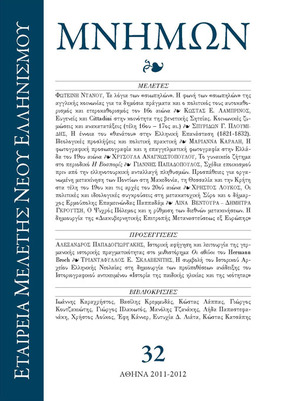Ευγενείς και cittadini στην κοινότητα της βενετικής Σητείας : Κοινωνικές ζυμώσεις και ανακατατάξεις (τέλη 16ου-17ος αι.)
Part of : Μνήμων ; Vol.32, 2012, pages 37-58
Issue:
Pages:
37-58
Parallel Title:
Nobles and Cittadini in the Community of Venetian Sitia : Social Fermentations and Rearrangements (late sixteenth-seventeenth century)
Section Title:
Articles
Abstract:
This study highlights the community of upper social class in Sitia, a small town in eastern Crete, in the late period of the Venetian dominion. Using new evidence from the State Archives of Venice, the article examines unknown aspects of the topic, such as the social identity of the community council (the so-called consiglio della comunità), the political functions and the evolution of this body, its internal social rearrangements and its particularities by comparison with the community dynamics in the other Cretan towns. The archival data indicate that this socio-political organ played a central role in local public life, but had a secondary position within the Venetian political system. Regarding its social composition, the community originally consisted of nobles-feudatories, according to the model of strict social organization in the island under Venetian rule. However, multiple factors of crucial importance, such as the small number of nobles in Sitia, the inadequate fortification of the town and the increasing financial needs of this region, had a catalytic effect on the local social fabric and, consequently, on the structure of the community: in the early seventeenth century it lost its aristocratic profile and acquired characteristics, which differentiate it from the other community entities of Crete. This decisive evolution occurred with the social advancement of the cittadini. Τhis intermediate social group acquired, with the consent of the Venetian authorities, the right to participate in the community in order to meet government targets in this politically sensitive area of the island. Hereinafter the cittadini had an increasingly strong presence in the community processes, gained more social power and enjoyed privileges previously monopolized by the aristocracy.
Subject:
Subject (LC):




